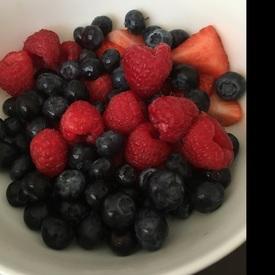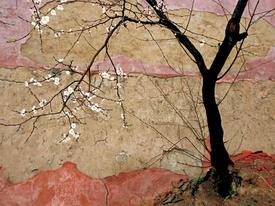Cooking with Spices Question

fastfoodietofitcutie
Posts: 524 Member
So I do not cook. I don't like it and I eat out almost every meal. That being said, I'm attempting to cook and need a little help from you experts out there. I decided to make a vegetable soup. I figure I can't mess that up too bad. The recipe calls for 1 tsp each of thyme, rosemary and basil. Heading to the spice aisle I realize there are three choices, leaves, crushed or ground. Which am I supposed to use for soup?
0
Replies
-
Depends on the result you're after. If you're going to puree your soup it won't matter. If you want the effect of flakes, go for crushed. If you don't care go for the cheapest1
-
I like flakes but crushed Rosemary, bay leaves I like whole2
-
You'll have to taste test. Drying and grinding increases the density of things, including the flavor of herbs and spices.2
-
If you are a beginner just pick whatever is cheapest. Unless you are a professional gourmand you are unlikely to tell any difference.4
-
I'd go with ground or crushed - whichever is cheaper.
I hate rosemary so I'd skip that actually. 2
2 -
Usually recipes are made for flakes. If it's ground or whole, the measurements are different and the recipe usually says "ground x" or "x leaves". A tsp of ground rosemary or thyme is a lot more potent than a tsp of whole leaves. Also, look for spices in the bulk food section. You can buy a small quantity and the price per ounce is a fraction of the premade jars.
Veggie soup is a great starter recipe!2 -
You probably want crushed. Except bay leaves. Other than a few recipes you want to dig those out at the end.
I think every house I’ve lived in has had a rosemary bush. They grow like weeds here.2 -
I usually go for ground when I cook, except for obvious spices (cilantro for example). It's just what I started out with, so I'm use to 'eye-balling' how much seasoning is needed. I might use a recipe, but taste while cooking and adjust for personal preferences. Plus, ground spices are easier to disseminate evenly throughout the dish IMHO. Leaves I might use if baking or broiling (fish in the oven with some lemon zest and bay, or ham with cloves), crushed if I want to experience the texture of the spice (rosemary comes to mind) but don't want to suck on a big dried leaf.1
-
Thanks everyone. I think I'll go with crushed and see how it goes. I really would like to start cooking more, I just hate all the work but extra calorie burn, right!2
-
Keep treating it like a hobby than a chore and it can stay fun.
Keep track of winning recipes and repeat them until you have them memorized. Then it's not hard.
I tried home made thousand island dressing this week and now I'm wondering why I didn't look it up sooner. It's hubby's favourite.7 -
Good luck!
Some things I've found out the last few years since I started using herbs and spices more.
1. When it comes to herbs and spices, you'll need to figure out what YOU like, in terms of intensity. I've noticed that for my family, most recipes don't have enough of a spice to feel flavorful for us. So we often use half again as much as is asked for.
2. If you decide you really like a spice, go check out indian and asian markets - these cultures tend to use MUCH more spice in their cooking than we do, and as a result, you can find spices much more cheaply, in much larger amounts, in these markets. I mean, like a 1/2 pound bag of some spices for less than you are getting the teeny little bottles for in the regular markets. The difference is kind of unreal.
3. If you get into using spices, I would also recommend checking out the RECIPES for asian and indian cuisine. More use of spice tends to translate to more knowledge about using the spices too. Not to mention some spices you've never heard of before but which are kind of awesome. Seriously, you get the best ideas for how to draw out the flavors of the spices in these recipes. And some great ideas for combinations, too.
And also, well...I'm gonna insult my own culture here. You'll see mistakes in using herbs and spices in American cooking that you'll see corrected in some of the recipes mentioned above. Like, for example, an American or British recipe adding in certain herbs while cooking, when all the nutrients and the color and the flavor are pretty much destroyed by cooking. But another culture adds that same herb AFTER the food is taken off the heat, so it retains a nice color and flavor, but the lower heat is just enough to wilt the herb and make it blend well with the texture of the dish. Or there can be the opposite, where a spice needs to be cooked for a while to eliminate a bitter flavor, and so on. That sort of thing has been hugely invaluable, you know?
5. If you start liking fresh herbs, I would highly recommend growing some. Fresh herbs are hella expensive, but growing them is pretty cheap, even in pots, and herbs tend to be like weeds; they don't need a lot of care. If you grow them, you can end up experimenting with them a lot more and it's not going to cost you a bank, you know?
6. When it comes to herbs - one thing to think about is that herbs and spices start losing their flavor over time. So when looking at how much of a spice/herb you are getting, it's good to know that the more that is done to a seasoning, the faster it loses flavor. Whole leaves/seeds will keep the flavor longer (you usually crush or grate them before cooking, except stuff like bay leaf where you leave it whole and take it out of the dish before serving), crushed keeps it less long, and ground keeps flavor the shortest amount of time (but will still be a few months).
So if you are getting something in bulk that may need to last a long time, the whole leaf/seed versions are better. On top of that, if time isn't a huge killer, whole leaves/seeds are more versatile, in their own way, because you can get a little mortar and pestle and make your own ground/crushed versions out of whole leaves. Can't make whole leaves out of ground up ones, though, you know?
Good luck, and have fun cooking!1 -
Thanks for all the spice tips, that's great!
My soup turned out good but the tortellini and all the vegetables soaked up the liquid so I guess I'm going to have to add more stock when heating it up. The ground spices worked well. Overall, my soup attempt wasn't a disaster so I'm happy!
5 -
That soup looks delicious! I often add extra stock when reheating things.1
-
fastfoodietofitcutie wrote: »So I do not cook. I don't like it and I eat out almost every meal. That being said, I'm attempting to cook and need a little help from you experts out there. I decided to make a vegetable soup. I figure I can't mess that up too bad. The recipe calls for 1 tsp each of thyme, rosemary and basil. Heading to the spice aisle I realize there are three choices, leaves, crushed or ground. Which am I supposed to use for soup?
I usually do crushed. Not a fan of leaves or ground.1 -
fastfoodietofitcutie wrote: »Thanks for all the spice tips, that's great!
My soup turned out good but the tortellini and all the vegetables soaked up the liquid so I guess I'm going to have to add more stock when heating it up. The ground spices worked well. Overall, my soup attempt wasn't a disaster so I'm happy!
That looks delicious!0 -
Please anyone with good recipe should write to my inbox. Trying to start cooking for my self.0
This discussion has been closed.
Categories
- All Categories
- 1.4M Health, Wellness and Goals
- 398.1K Introduce Yourself
- 44.7K Getting Started
- 261K Health and Weight Loss
- 176.4K Food and Nutrition
- 47.7K Recipes
- 233K Fitness and Exercise
- 462 Sleep, Mindfulness and Overall Wellness
- 6.5K Goal: Maintaining Weight
- 8.7K Goal: Gaining Weight and Body Building
- 153.5K Motivation and Support
- 8.4K Challenges
- 1.4K Debate Club
- 96.5K Chit-Chat
- 2.6K Fun and Games
- 4.8K MyFitnessPal Information
- 12 News and Announcements
- 21 MyFitnessPal Academy
- 1.5K Feature Suggestions and Ideas
- 3.2K MyFitnessPal Tech Support Questions










